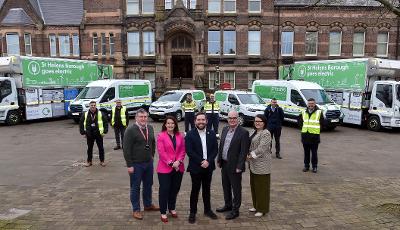Council charges towards net zero with electric fleet upgrade
A suite of new electric vehicles has joined St Helens Borough Council's growing green fleet, from small vans to recycling collection vehicles.

Article date: 8 March 2024
The fleet's additions are six Ford E Transit electric panel vans, one utility vehicle, 23 Toyota Proace light commercial electric vehicles and two kerbside sort electric recycling vehicles, which are among the first of their kind purchased in England.
The growing green fleet of 34 electric vehicles and one truly pioneering hydrogen fuel cell electric refuse collection vehicle - custom made by German manufacturer Faun Zoeller and the first in operation in the UK are helping St Helens Borough Council towards achieving its target of net zero carbon by 2040.
Procurement of the vehicles is part of ongoing plan to replace ageing council vehicles with electric and low-emission alternatives, saving money and cutting carbon emissions by 100s of tonnes every year.
To facilitate the charging of the new electric vehicles St Helens Borough Council has installed 25 EV charging points in its Hardshaw Brook Depot as the first phase of its EV charging infrastructure.
The move supports the council's ambitious Climate Action Plan adopted last year, which set out an initial list of 134 activities that will help the borough to achieve its target of net zero carbon by 2040.
Alongside the reduced emissions, the modernisation of the fleet is helping to increase service resilience and efficiency, with less downtime for repairs and reduced maintenance costs, which had begun to spiral with many vehicles long past their industry standard lifespans.
And it's providing opportunities for staff to learn and develop new skills that will serve them well as the switch to sustainable transport continues.
Councillor Andy Bowden, St Helens Borough Council's Cabinet Member for Environmental Services and Climate Change, said:
"This replacement programme is supporting our services to undertake wider modernisation and provide flexibility for the future. It will also ensure that our workforce has access to modern and fit for purpose vehicles and equipment, increasing service efficiency and cutting maintenance costs dramatically.
"And by adopting more electric and hydrogen vehicles we continue our transition to a low carbon fleet in a managed way, taking further significant steps towards our ambitious target of net zero emissions by 2040."




